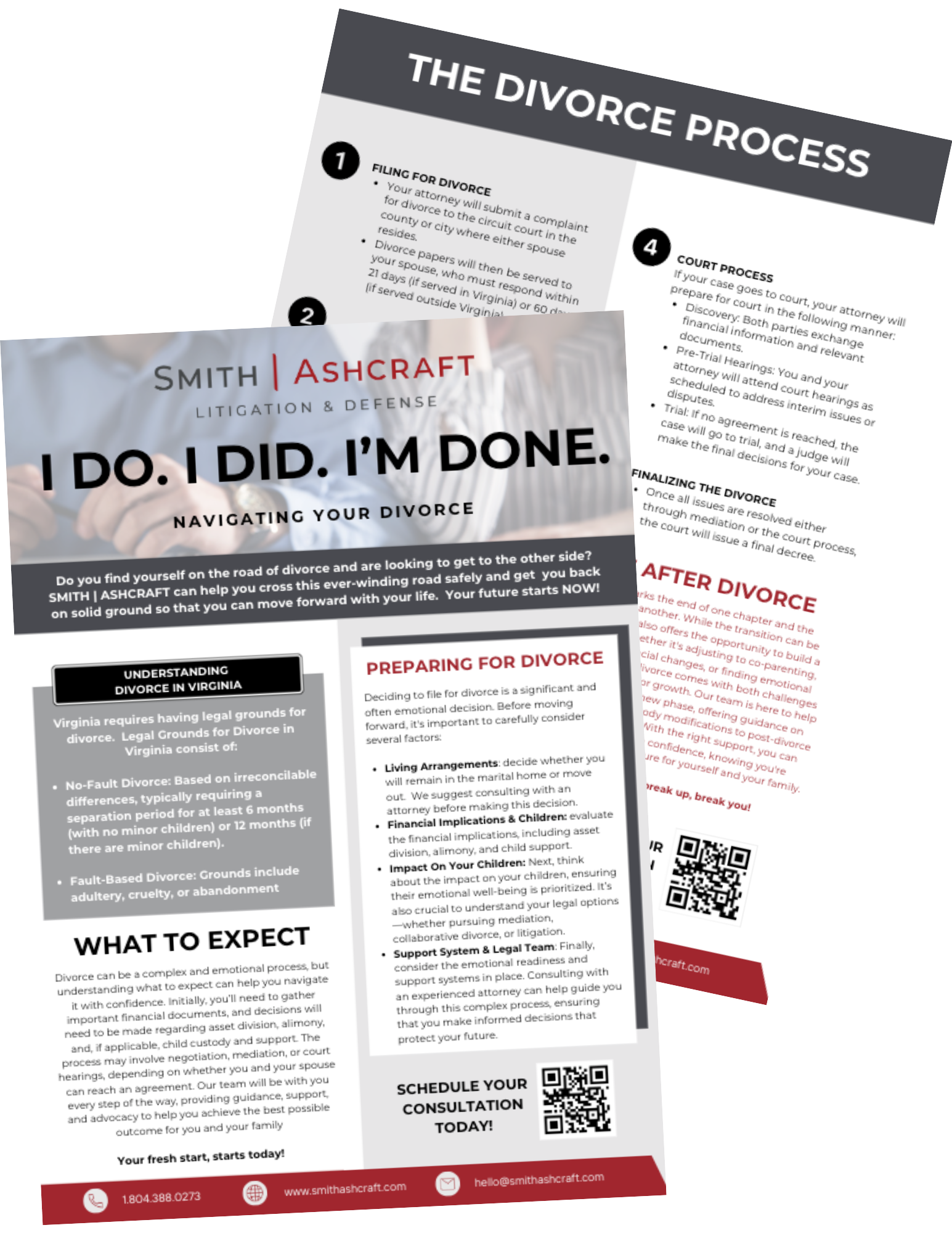Abuse / Cruelty
Abuse/Cruelty
Abuse or domestic violence in the divorce context is called cruelty. If a spouse is physically abusive to you, you can ask the Court for a divorce. This can be years of abusive acts or even a single serious incident. Proving this is best done by witnesses, photos, and medical records.
Mental or psychological abuse is a little harder to prove. In Virginia, it’s called constructive desertion. It’s rooted in cruelty (some previous act of physical abuse is usually required), but is essentially the habitual humiliation of one spouse by the other that has grown to the point that living together is so intolerable that continuing the relationship is no longer possible.
Even though this is a ground for divorce, the Court still requires one year of separation before entering a final decree of divorce on the ground of cruelty. This means we can file for divorce, but the court cannot grant it until the year-long separation has concluded.
If you are in an abusive relationship or have been accused of abuse, please at very least consult with Smith | Ashcraft to discuss the facts and get some advice on how to protect yourself.
Everything You Need to Understand to
Better Navigate Your Divorce
At SMITH | ASHCRAFT we are here to get you through this chapter of your life.
Your future starts NOW!
Grounds for Divorce
In Virginia, grounds for divorce or separation can be categorized into two main types: fault and no-fault grounds.
Learn more about what type of divorce would best represent your situation.
Separation
In Virginia, there is no “legal separation” like other states have. When we talk about separation, we are talking about when one spouse intended to no longer be married. Learn more about the important points you should consider in a seperation.
Property Division
One of the most complicated issues in divorce is the division of property. This includes the division of debt as well. Lawyers and judges call this equitable distribution. This means that property and debts are not necessarily divided equally. Rather, it will be done “equitably.” Learn more about how your property and assets may be divided in a divorce.
Spousal Support
Because divorce creates two households, each with its own set of expenses, there is often a need for one spouse to receive spousal support, sometimes called alimony. The primary reason for a court to award spousal support is to help ensure that both parties continue to live a similar standard of living to the standard they enjoyed during the marriage. Learn more about the factors that contribute to determining spousal support and how this may impact your case.
Military Divorce
First of all, thank you to our military servicemembers and their families for the many sacrifices your service includes.
Military service comes with additional, special considerations in a divorce matter. There are federal statutes and rules that take priority over the normal state laws governing divorce.
Learn more about the special considerations taken when it comes to a military divorce.
Name Change
An adult may legally change his or her name in Virginia. This can be done as part of a divorce or in a separate filing.
Learn more about name changes and how we can help you in this process.
Prenuptial and Postnuptial Agreements
Prenuptial and postnuptial agreements directly impact your rights and obligations in the event of a divorce. Learn more about the complexity of these agreements and how they impact your case.
Helpful Articles
What Our Clients Have To Say
There's no where in Virginia that we don’t know
At SMITH | ASHCRAFT, we are proud to offer comprehensive legal services throughout Virginia. Whether you’re in Richmond, Northern Virginia, the far reaches of Roanoke, or any other part of the state, our experienced team is here to provide experienced representation tailored to your unique needs. No matter where you are in Virginia, we’re committed to delivering the same high level of service and dedication to each client, ensuring your case receives the attention it deserves.
Contact Us









